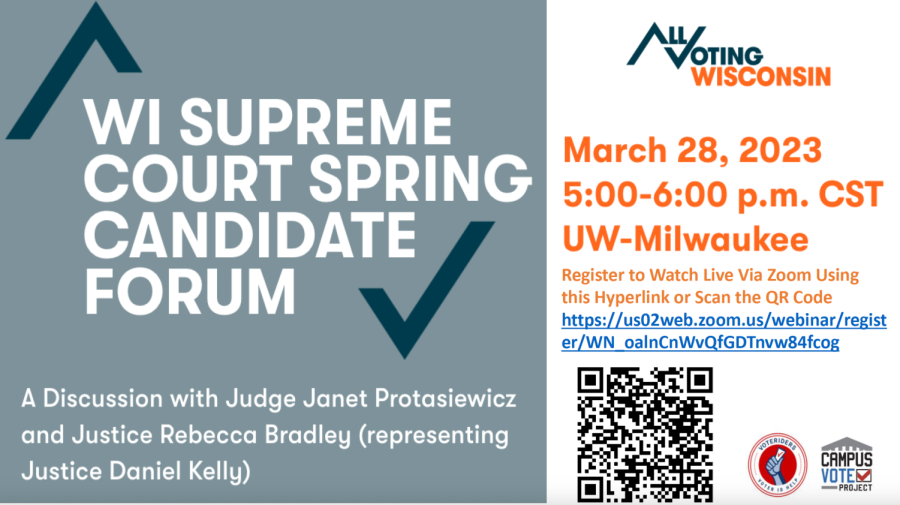“Why are you the best candidate?”: WI Supreme Court Candidate Forum
April 3, 2023
On Tuesday, March 28, the Wisconsin Supreme Court Spring Candidate Forum took place at UW-Milwaukee from 5:00 p.m. to 6:00 p.m. and was live-streamed.
All Voting is Local and Campus Votes Project moderated the forum between the two candidates, and all the questions asked had been submitted by Wisconsin college students. The forum was a discussion with Judge Janet Protasiewicz and current Justice Rebecca Bradley, who represented in place of Justice Daniel Kelly.
According to allvotingislocal.org, they are a “nonpartisan organization that exists to expose and dismantle threats to voter freedom.” It also states that they “urge officials to create and maintain policies that enable all voters to register and vote without problems, and to have the assurance that no matter how they vote, their vote will count.”
All Voting is Local collaborated with the Campus Vote Project which, according to their website, “works with universities, communities, colleges, faculty, students, and election officials to reduce barriers to student voting.”
Justice Bradley, who has been serving on the Wisconsin Supreme Court since 2015 said, “It is my pleasure to be here on behalf of Justice Daniel Kelly. He really regrets that he was unable to attend the date that was set for this event, and he was already committed somewhere around the state talking to voters. It is my pleasure, my honor, to stand in and speak on his behalf.”
Judge Protasiewicz, who has been serving on the Wisconsin Circuit Court in Milwaukee since 2014, said, “I decided to run for this seat for really one simple reason. That is to ensure that far-right extremists do not hijack our Supreme Court.”
The first question that was asked by the Campus Vote Project said, “How do you balance being an independent judge with being an elected official?”
Justice Bradley said, “Being an independent judge and an elected official in the state of Wisconsin are completely compatible things. You may know that we wear black robes when we are serving as judges and as justices. That black robe symbolizes our commitment to the people of Wisconsin that we will set aside our personal preferences, our political leanings, and our personal beliefs to decide cases in accordance with the Constitution and the other laws that we are governed by.”
Justice Bradley continued, “An independent jurist, however, should not talk about his or her personal values or policy preferences. It is antithetical to our ethic code.”
Judge Protasiewicz said, “Being an independent judge is critically important. Every single day when I go to work, I put on that black robe, and I become Judge Janet. That means that all of my decisions have to be based on the law, and on the Constitution…You have to put aside your personal beliefs and your personal feelings, so I put that robe on every day, had a lot of experience doing that. I have been really trained to do that… to put aside your personal feelings and go ahead and apply the law and be independent on these cases.”
The rules of recusal, which are Due Process clauses of the United States Constitution, require judges to recuse themselves from cases in the situation where there is a strong possibility that the judge’s decision would be biased or if the judge has a financial interest in the case’s outcome.
The third question asked, “What is your take on female reproductive rights and how is that take beneficial to the citizens of the United States and Wisconsin?”
“The Supreme Court of Wisconsin cannot, and will not, decide whether there will be abortion in this state. That is for the people to decide through their elected representatives in the legislature… [Dobbs v. Jackson] is returning the issue to the people through their elected representatives through the legislature to decide that issue,” said Justice Bradley.
Judge Protasiewicz said, “I have been very clear with everybody that I think women should have a right to choose. Now, I would say this, I can’t comment on what I would do in any case… That robe goes on, my personal opinions go out the door. My personal value is that women should be able to make their own reproductive health care decisions. We are operating under an 1849 ban. A near-total ban. In 1849 women could not vote. You look back to 1849 and today, and we certainly hope that medical science has progressed not just a little but a lot.”
Judge Protasiewicz continued, “I was just at an event that was hosted by a number of OBGYNs, and what they said is, ‘we are concerned, we are so concerned that we don’t know if we want to continue to practice medicine in this state’… I have talked to young people who have said ‘I want to raise a family in Wisconsin, I don’t want to try to raise a family in Wisconsin under these circumstances, because if I have a tough decision to make the way the law is written, I am not able to make that decision.”
The final question asked by the Campus Votes Project said, “At what point should the doctrine of Stare Decisis be followed and when should it be overturned? Stare Decisis is the doctrine that courts will follow legal precedent in their rulings.
The first question given by All Voting is Local said, “What are your plans for addressing redistricting if the issues arise before the Court?”
Justice Bradley said, “Article IV of the Wisconsin Constitution assigns the responsibility for redistricting to the legislature… our job as justices is to make sure that the law is followed.” Bradley continued, “because people move, the districts get imbalanced and we have to ensure that we uphold one person, one vote… If you are living in a district that has become overpopulated, it dilutes your vote.”
Judge Protasiewicz said, “I would certainly like to take a new look at that. I have been very clear about what I think about our maps. I went so far as to say when I was in Madison for a forum in January that I think our maps are rigged. I think it is really hard to convince any rational person that our maps are fair. That being said, I don’t know how the issue will come before the Court. So I cannot tell you what I would do.”
The second question asked, “As the debate around transgender and queer rights grows, what are your thoughts on the role of the Wisconsin Supreme Court on issues of sex and gender orientation?”
Justice Bradley responded, “With respect to anybody who is a member of the LGBTQ community, we are duty-bound, and we will uphold the rights of the LGBTQ community. How we do that is no different from how we ensure that the rights of any citizen in America and in the state of Wisconsin are protected”
Judge Protasiewicz said, “That really depends on what kind of case comes before the Wisconsin Supreme Court. It is pretty clear and I think that everyone understands that I am an ally. That is critically important.”
The third question that was asked was, “What is your view on the role of the judiciary in addressing issues related to the environment and natural resources, including issues such as climate change and pollution?”
Justice Bradley said, “Again, under Article IV, the people of Wisconsin have vested the legislature with the lawmaking power-with making those policy decisions… It is the role of the governor, through the executive branch, to make sure those laws are executed… So, the governor has a role to play there as well, in interpreting and applying the law in environmental issues.”
Judge Protasiewicz said, “I am from Milwaukee. I am from an urban area. I was talking to some small farmers, and they said to me, ‘That farm that we own, that is everything that we have, that is our progeny. We pass it down from generation to generation. If there are forever chemicals in our soil, those forever chemicals harm our ability to grow our agriculture. They kill our live stalk, and we will not have a functioning family farm under those circumstances… I am very proud to have the endorsement of the Wisconsin Conservation voters… and I am honored to have that endorsement.”
The last question asked by All Voting is Local said, “Why are you the best candidate for the Wisconsin Supreme Court?”
Justice Bradley responded, “Justice Kelly is the best candidate to be returned to the Wisconsin Supreme Court because he is the only candidate in this race who has made a commitment to administer justice without respect to persons. There have been multiple times when Justice Daniel Kelly voted contrary to what people might expect him to vote…He invariably and steadfastly applies the law as it is written, and not as he may wish it to be. He is far superior to Janet Protasiewicz, who is promising to replace the rule of law, get rid of our Constitution, get rid of our written law, and take on the role of a legislator… A vote for Justice Daniel Kelly is a vote for liberty, a vote for the Constitution, a vote for rule of law, and a vote to retain your right as the people of Wisconsin to govern yourselves.”
Judge Protasiewicz said, “I have a tremendous amount of experience in the District Attorney’s office working very hard to protect victims, uphold people’s constitutional rights and keep our community safe. I have done that for a long time, prosecuting some of the most challenging cases in Milwaukee County, some of the most violent cases. I work very hard to do that. As a judge, I have done the same thing, just finished three years of homicide and sexual assault court… That is a big balancing act, making sure that everyone is treated fairly across the board. In contrast, my opponent has never sentenced anybody, ever… I can tell you that my experience goes beyond just being in the courtroom. I have taught trial advocacy at Marquette. I have taught for the United States Department of Justice, really teaching people what you need to do, to be able to successfully prosecute a case. But, beyond all of that, I am fair, I am impartial, I am independent, there is no ‘thumb on the scale’ when I walk into the courtroom and I hope that everyone who knows me also knows that I am compassionate and fair.”
To vote on Tuesday, April 4, 2023, you must be registered to vote in the state of Wisconsin. You can see if you are registered on My Vote Wisconsin, as well as the location of your polling place. For more information on how to vote tomorrow, read our article here.







